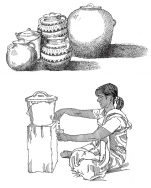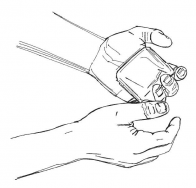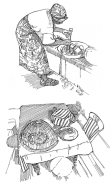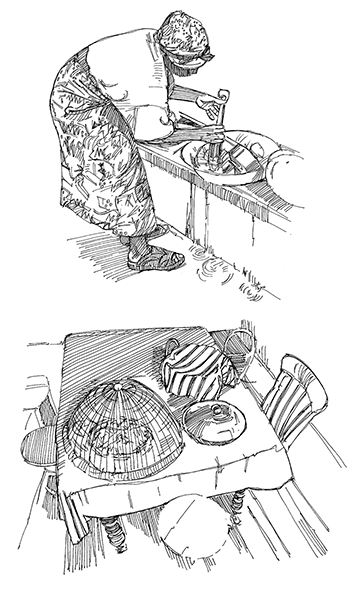31. Good food hygiene
31. Good food hygiene
Last update: 2025-06-03
Overview
- Food that is not clean, covered and thoroughly cooked can contain germs that cause people to fall sick.
- People in the community may not know or understand how food can be contaminated or how a disease can spread through food. It is important to explain the importance of good food hygiene so that people can protect themselves and their families from becoming sick.
What to do and how to do it
Promote safe food preparation
- Food can be contaminated by dirty hands, flies, dirty utensils or contaminated water.
- Wash hands with treated water and soap before you cook or eat.
- Use treated water for cooking. Wash vegetables and fruits thoroughly with treated water and soap.
- Wash utensils (pans, plates, cups, forks, knives, etc.) and clean kitchen surfaces with treated water and soap. Use a rack for drying dishes.
- Food can spread germs and diseases if it is not well cooked or if it is dirty.
- Cook animal products thoroughly, including meat and eggs, to kill germs.
- Destroy and throw away any animal meat, offal or skin parts that are visibly affected by infections or parasites e.g., presence of worms, cysts or eggs, tubercules in lungs or liver, infected animal skin etc. Do not wash, cook or eat any of these.
- Cover cooked food before storing. Reheat before eating.
- Eat cooked food hot.
Promote safe food storage
- Food can be contaminated if stored improperly
- Store uncooked food in containers that are inaccessible to insects and animals
- Cooked food should always be stored properly, safe from weather changes, and covered to keep out dirt, flies, other insects and animals. Cooked food should not be stored for long periods of time. After cooking, it should be eaten promptly.
Promote food hygiene with food vendors in market and stalls
- Encourage to use mosquito netting or inverted bowls on plates to avoid contact with flies and insects
- Use chlorinated water to prepare drinks and ice
- Food servers should wash hands with water and soap before they prepare and serve food
- Food should be thoroughly cooked, especially seafood, and not be stored at room temperature for long periods
- Do not put plates and utensils on the ground, but use a clean surface
- Food and meat vendors at abattoirs and slaughterhouses should not sell any animal meat, offal or skin parts that are visibly affected by infections or parasites e.g., presence of worms, cysts or eggs, tubercules in lungs or liver, infected animal skin etc. These should be condemned and destroyed.



